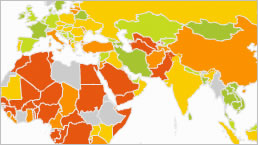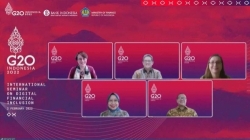
Mar 24, 2022 |
GPFI News
The Indonesia G20 Presidency held an International Seminar on Digital Financial Inclusion on 2 February 2022, back to back with the First Plenary Meeting. The objective of the seminar was to showcase policy and program to expand the use of digital financial services in supporting economic and financial inclusion. The seminar also shared best practices of the use of affordable and responsible digital financial services from policy makers, regulators, industries, and other relevant stakeholders to boost financial inclusion.
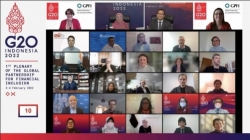
Mar 24, 2022 |
GPFI News
On 3-4 February 2022, the GPFI met virtually for the first time under the Indonesian G20 Presidency. Group members discussed the GPFI work programme for 2022, based on the priorities established by the Presidency and the commitments in the GPFI's Financial Inclusion Action Plan (FIAP). The Plenary agenda focused on three topics: (i) Digital Financial Inclusion; (ii) SME Finance; and (iii) the OECD review of the G20 High-Level Principles on Financial Consumer Protection.
Mar 24, 2022 |
External News

Nov 18, 2021 |
GPFI News
On 4-5 October 2021, the Italian G20 Presidency hosted in the premises of the Bank of Italy in Rome the G20 GPFI High-Level International Symposium 'Coping with new (and old) vulnerabilities in the post-pandemic world'. The aim of the Symposium was to present to the international community the work carried out by the GPFI in 2021 and to hear from high-level academic and institutional experts on how to leverage on digitalization to leap forward in terms of financial inclusion, while limiting the risks of exclusion related to digitalization itself. Specialists shared their insights and knowledge on the impact of digital finance on financial inclusion of individuals and SMEs, including by gender, and the role that financial education and consumer protection can play in overcoming knowledge barriers, build trust and guide innovation towards more customer-oriented and responsible digital financial products. The 2-day Symposium was opened by Her Majesty Queen Maxima of the Netherlands, Honorary Patron of the GPFI, and hosted the introductory remarks of the Governor, Mr. Ignazio Visco, on the first day and of the Minister of Finance, Mr. Daniele Franco, on the second day.
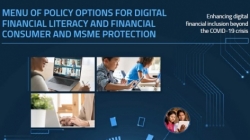
Nov 18, 2021 |
GPFI News
Informed by the main results stemming from four of the six Reports produced by GPFI implementing partners (link to the other news), the GPFI under the Italian G20 Presidency delivered the G20 Menu of Policy Options for digital financial literacy and financial consumer and MSME protection “Enhancing digital financial inclusion beyond the COVID-19 crisis”. The Policy Options contained in the Menu are grouped into three pillars:
(i) addressing the impact of the crisis and thinking ahead;
(ii) leveraging digitalization for a leap forward in financial inclusion;
(iii) addressing new and exacerbated risks and vulnerabilities.
A technical annex complements the Menu, providing concrete examples of good practices and effective policy approaches to drive action of governments of G20 countries and beyond in adopting policies to leap forward in financial inclusion, in light of the new challenges and opportunities involved by the growing digitalization of finance.
View Dr. Magda Bianco, Head of Directorate General for Consumer Protection and Financial Education of the Bank of Italy, speak about the G20 Menu Policy Options here.
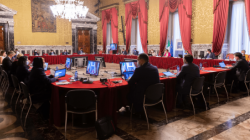
Nov 18, 2021 |
GPFI News
On 6 October 2021, the GPFI hosted the Third Plenary Meeting with the objective to provide an overview of the deliverables that have been accomplished under the Italian G20 Presidency and obtain the final approval by GPFI members. The Meeting represented also an occasion to start discussing some relevant issues that will need to be addressed by the GPFI going forward, in particular the issue of data collection for SME financing. The incoming Indonesian G20 Presidency has outlined the main features of the program they intend to pursue in 2022. Under the general headings “Recover together, recover stronger”, the efforts of the GPFI community will be directed towards a continued promotion of financial inclusion through digitalization, with the aim to increase productivity and support a sustainable and inclusive recovery.

Nov 18, 2021 |
GPFI News
The document reviews the more recent evolution of remittances transfer costs as well as the progresses accomplished by G20 countries in the realisation of their respective 2019 National Remittances Plans.

Nov 29, 2021 |
GPFI News
Under the Italian G20 Presidency, the GPFI took stock of countries’ strategies to tackle the challenges and seize the opportunities for financial inclusion posed by the pandemic. In line with the objectives of the G20 2020 Financial Inclusion Action Plan, and building upon the far-reaching work done during past G20 Presidencies, GPFI implementing partners have produced six reports, which present the policy responses and innovative approaches that have proved effective in mitigating the impact of the crisis and could guide policymakers in designing the recovery phase with a view to the future:


